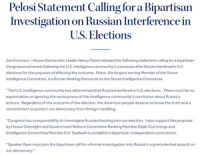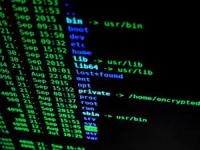-
Hysteria over Jade Helm exercise in Texas was fueled by Russians, former CIA director says

Gov. Greg Abbott’s decision in 2015 to ask the Texas State Guard to monitor a federal military exercise prompted significant criticism. A former CIA director said Wednesday that the move emboldened Russians to next target elections.
-
-
U.S. official: Executive order not needed to ban Huawei in U.S. 5G networks

“We have grave concerns about the Chinese vendors because they can be compelled by the National Intelligence Law in China as well as other laws in China to take actions that would not be in the interests of the citizens of other countries around the world. Those networks could be disrupted or their data could be taken and be used for purposes that would not be consistent with fundamental human rights in those countries,” says Robert Strayer, deputy assistant secretary of state for cyber and international communications and information policy.
-
-
Breaking down the anti-vaccine echo chamber
In these days of Facebook and Twitter, it is easy enough to block out the opinions of those you disagree with, and only associate with people whose voices reinforce your own opinions. These echo chambers have real-world implications; currently, the U.S. is in the midst of its largest measles outbreak in decades. That’s why it’s important to find ways to communicate across the vaccination divide.
-
-
Electricity grid cybersecurity will be expensive – who will pay, and how much?

Russia, China, North Korea and Iran are capable of hacking into the computers that control the U.S. electricity grid. Protecting the grid from hacking would cost tens of billions of dollars. The electricity customers will likely foot most of the bill.
-
-
Crossing a cyber Rubicon?
Amid a massive exchange of rocket fire and airstrikes between Israel and both Hamas and Islamic Jihad this weekend, Hamas attempted a cyber operation against an unspecified civilian target in Israel. The operation failed, and in its aftermath the Israel Defense Forces carried out an airstrike that destroyed the building housing Hamas’s cyber capability. Some observers are citing the incident as an important—and perhaps dangerous—precedent. Others are questioning the legality of the strike itself. Robert Chesney writes in Lawfare that both these views are misplaced.
-
-
Facebook removes more pages, accounts linked to “inauthentic” Russian operators

Facebook said it has removed more pages and accounts that are believed to have originated in Russia and were involved in “coordinated inauthentic behavior.”
-
-
Agents of deceit: Russian disinformation institutions and actors

There is a burgeoning Western literature on Russian policy and practice in disinformation, but very little of it has detailed and reliable material about the government agencies and affiliated actors that promote it. A new, detailed report investigates the institutions and actors involved in Russian disinformation.
-
-
Blockchains are being exploited by bots for profit

Blockchains have been hailed as fair and open, constructed so a single user can’t falsify or alter records because they’re all part of a transparent network. The reality is not so simple, according to new research.
-
-
Flaws in metrics for user login systems

How good is the research on the success or failure of the system that verifies your identity when you log into a computer, smartphone or other device? Chances are it’s not good, and that’s a major security and privacy issue that should be fixed.
-
-
Why do some people believe the Earth is flat?
Why, despite overwhelming scientific evidence to the contrary, is the flat-Earth movement gaining traction in the twenty-first century? One expert says that, in part, it is due to a general shift toward populism and a distrust in the views of experts and the mainstream media. There is an “increasing distrust in what we once considered to be the gatekeepers of knowledge – like academics, scientific agencies, or the government,” she says. In this kind of environment, “it becomes really easy for once-fringe views to gain traction.”
-
-
The Russia investigation will continue
Special Counsel Robert Mueller’s Russia probe is over, but the FBI is almost certain to continue its counterintelligence investigation into Russian espionage efforts related to the 2016 election. The FBI will continue to search for Americans working on behalf of the Kremlin. John Sipher writes in The Atlantic that the inability to establish that the Trump campaign conspired in a “tacit or express” agreement with the Russian government is not surprising. Most espionage investigations come up empty unless and until they get a lucky break. That does not mean there was no espionage activity in relation to the 2016 election. Every previous Russian political-warfare campaign was built on human spies. Russian “active measures”—propaganda, information warfare, cyberattacks, disinformation, use of forgeries, spreading conspiracies and rumors, funding extremist groups and deception operations—rely on human actors to support and inform their success. Counterintelligence professionals must doubt that Russia could have pulled off its election-interference effort without the support of spies burrowed into U.S. society or institutions.
-
-
Russia’s long game: Paralyze Europe’s ability to act in its own self-interest
With the European parliamentary elections approaching in less than a month’s time, Russia’s persistent disinformation campaign to subvert and undermine Europe’s democratic institutions is a source of growing worry. Russia is playing a long game in Europe: its objective is not merely to influence the outcome of any particular election, but rather to broadly subvert the efficacy of Europe’s democratic institutions, fuel widespread social fragmentation and mistrust, and ultimately paralyze Europe’s ability to act in its own self-interest and to defend our values.
-
-
Christchurch-style terrorism reaches American shores
In wake of the attack at Chabad synagogue of Poway, California, it is important to examine digital communications surrounding the shooting and what they suggest about future terrorist activity.
-
-
Blinded and confused: Security vulnerabilities in “smart home” IoT devices
Researchers have identified design flaws in “smart home” Internet-of-Things (IoT) devices that allow third parties to prevent devices from sharing information. The flaws can be used to prevent security systems from signaling that there has been a break-in or uploading video of intruders.
-
-
Influence operations in the digital age
Influence operations in the digital age are not merely propaganda with new tools. They represent an evolved form of manipulation that presents actors with endless possibilities — both benign and malignant. While the origins of this new form are semi-accidental, it has nonetheless opened up opportunities for the manipulation and exploitation of human beings that were previously inaccessible. Zac Rogers, Emily Bienvenue, and Maryanne Kelton write in War on the Rocks that digital influence operations, now conducted across the whole of society, indicate that we are only at the beginning of a new era of population-centric competition. With regard to propaganda, the fundamental distinction between the old and the new lies in the difference between participatory and passive forms of information consumption.
-
More headlines
The long view
Researchers Develop AI Agent That Solves Cybersecurity Challenges Autonomously
New framework called EnIGMA demonstrates improved performance in automated vulnerability detection using interactive tools.
